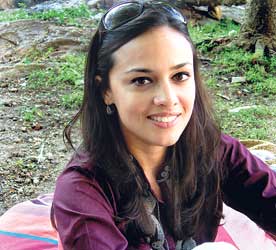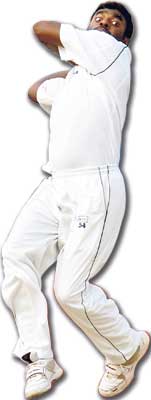
Giving a different spinIndian poet Tishani Doshi is working on a biography of Muttiah Muralitharan. She tells Sunila Galappatti how it all came about I met Tishani Doshi between sessions of the Galle Literary Festival, in the impromptu café area outside the Festival’s main venue. We sat on a rug under the trees and raced through our conversation, both anxious to hear Vikram Seth who would be speaking shortly. Out of a corner of my eye I could see men I knew hovering around our interview, hoping I would introduce them to this beautiful Indian woman. Others came up and reported cricket scores to Tishani. This led us nicely to the question: how did Tishani Doshi, poet, novelist, dancer, come to work on a biography of Sri Lanka’s beloved cricketer Muttiah Muralitharan?
It was very random. A lot of things in my life have been very random. I didn’t go looking for it. I came to Sri Lanka to work with somebody who was making a film. Afterwards I travelled around by myself and met some photographers and did some stories. I met Murali for some journalistic piece and I was quite struck by him as a personality. He’s very passionate about cricket but also about everything. When I got back into cricket (I’d been in the States for a long time and I hadn’t watched cricket for many years) I thought ‘wow, this guy’s really quite an amazing symbol’. And not just for Sri Lanka, or because of the fact that he’s Tamil and is a bridge between the Tamils and the Sinhalese. Also he’s making world records. I was really irritated by the fact that he was given such an unfair shake in the press and that nobody wanted to give him credit. I mean - I’m sorry - I say chuck and take a thousand wickets! Give credit where it’s due. This bothered me and at the time I thought I would do a long piece about racism and cricket. But I realised pretty soon that I didn’t have the muscle or the ability to get into those kinds of murky territories. But I was still intrigued by Murali as a character and the idea of a ghostwritten biography. I said ‘if you ever do something like that I would like to be involved in the project’. So I’m not writing the book. Originally I was meant to be writing a few chapters but I think we’ve decided now that one person will write it because it’s simpler. But I did all the research in terms of his childhood and his Tamil background and the riots and so on. I talked to his parents and brother and headmaster and teachers and school-friends and went to his boarding school where he spent all his life before he became an international cricketer. I mean it’s like this for me: everyone knows what he does on the field but what was more interesting was to see what was behind that. And because of the tsunami I got to see this humanitarian side of him. He was here while the rest of the team was in New Zealand and he said ‘you guys have to come back because Sri Lanka’s going through a crisis’. And this was within the first day - not two or three days later. He was on the phone himself, he was cutting through bureaucratic red tape, he was arranging supplies. He did three trips – North, South and East. I went with him on the trip to the South so in fact the last time I was in Galle was after the tsunami and I hadn’t come back since.
He knows what he does as a cricketer but there’s none of this arrogance that I feel is quite common in a lot of sportspeople. With him it’s ‘I’m doing the best that I can because I can do this and it’s my responsibility to do certain things because I’m in a position to do that’. And not many people make that choice either. There are funny stories: when Murali was in England for the first time these guys told him ‘it’s very cold and you’d better practise or your fingers might get frozen’. So while he was in his hotel room he had his hand out of the window, spinning the ball. This kind of thing interested me – as did his journey from being a young man to someone quite accomplished and experienced at dealing with the press and dealing with controversy. I think he’s a very admirable person. It really struck me that this guy is a personality and a character and I think as a writer you always want to feed into things that don’t necessarily have to do with your life. I get along with artists and painters and writers but for a long time I hung out with cricketers and it was fun to be that fly on the wall. What is it about cricket itself that she likes? Well, I guess I like the fact that it's a slow game (although that's changing). I think we're too in love with the fast: we expect everything to be done quickly and to fit into our short attention spans. I like the idea of things taking time – with a sensuality that's missing. Of course 20/20 is changing all that, but in spirit I think cricket is a game that requires patience - of its players and followers - and I like that. Tishani’s pursuits range widely. She has worked as a dancer with the late Chandralekha and has travelled to Antarctica with a group of teenaged students. She is just completing a novel based loosely on her own parents’ long-distance love affair (her father is Gujarati and her mother is from North Wales). Tishani has won awards as a poet but says she still feels a little pretentious calling herself one. I asked her if in defining herself any of these talents comes first? It comes first if I’m doing it at that time. So if I’m dancing that comes first, and if I’m writing that comes first. But in terms of defining myself, I would say writing probably comes first. I remember one of the first big readings I did was with Seamus Heaney and Margaret Atwood at this festival in Wales and I was so glad then that I had danced and I’d been in front of thousands of people and I had carried the show (it’s just me and one male dancer and I’m on stage for 70 minutes). So I rose to the occasion, or I would have been mortified next to those people. I remember talking to Margaret Atwood later and saying ‘you know, it really bothers me that I can’t write funny poems’. I’ve tried but I can’t because I write poetry only when I’m reacting to something that I find troublesome or violent or painful or something like that. She said ‘Oh don’t worry about it. When your hair starts falling out then you can worry about writing funny poems. You’re doing just fine.’ |
|
||||||
|| Front
Page | News | Editorial | Columns | Sports | Plus | Financial
Times | International | Mirror | TV
Times | Funday
Times || |
| |
Reproduction of articles permitted when used without any alterations to contents and the source. |
© Copyright
2008 | Wijeya
Newspapers Ltd.Colombo. Sri Lanka. All Rights Reserved. |

